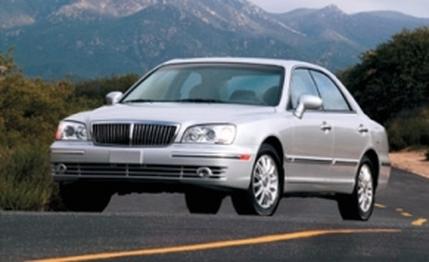 First Drive Review
First Drive Review
It takes determined optimism to live and build vehicles within artillery range of Kim Jong Il's massed armies. That's why Hyundai could see through the dark days of 1998, when it sold only 90,217 cars in North America, dealers were walking away from their franchises, and the company name was easy comic shorthand for lousy quality. Hyundai lives next door to a murderous despot and still has a sunny enough outlook to provide a 10-year powertrain warranty.
Hyundai launched the 3.0-liter V-6-powered 2001 XG300 sedan as a leap of faith: the biggest and most expensive car the company had ever sold here. Then it bounced the engine displacement to 3.5 liters for 2002 and renamed it the XG350. Big and expensive are relative, though, and the updated 2004 XG350 that goes on sale about the time you read this comes in at 191.9 inches long (the same length as a Toyota Avalon) and should carry a modest sub-$25,000 base price. The 3.5-liter DOHC 24-valve V-6's 194 horsepower also makes the XG350 the second most powerful Hyundai ever sold here. The "most powerful" being the Santa Fe SUV that now offers the same V-6 rated at 195 horsepower.
A new face and a revised tail are the obvious changes to the 2004 XG350. The new grille and projector-beam headlamps-and moving the license-plate holder from the rear bumper to a recess in the new decklid-further the XG's resemblance to DaimlerChrysler's Maybach so much that one has to wonder if it's merely coincidental or, if not, who exactly is copying whom? Like the Maybach's, the XG350's appearance is more justly criticized for overall conservatism than for jarring details.
The decklid now has hydraulic pistons operating on its gooseneck hinges, and that's typical of the other detail changes. Standard equipment inside both the XG350 and the upper-crusty XG350L includes reading lights in the C-pillars, a HomeLink garage-door opener, an electrochromic rearview mirror, and a cargo net in the trunk. The slightly more subdued faux wood trim is now milled from faux trees felled in a cheerier faux forest. The most significant functional improvements are an increase in front disc brake diameter from 10.9 to 12.0 inches (rear discs and ABS are also standard) and the inclusion of a full-size spare tire on an alloy wheel.
Leather seating surfaces and the usual power accessories are standard in both grades of XG. The plastic components are nicely textured, and assembly finish is precise. Beyond that, the L version gets memory and heating elements for the front seats, a tilt-down feature on the side-view mirrors when the car is in reverse, a sunroof, two additional spokes in each wheel (for a total of 12), plus Infinity speakers and a 210-watt amp for the AM/FM/CD/cassette sound system. In an era of in-dash CD changers and pocket-size 7500-song MP3 players, the optional eight-disc changer in the trunk is throwback technology. No navigation system is offered, but there are map pockets in each front door!
The interior feels very Toyotalike-circa 1993. And 1993 was a dang good year for Toyotas. The XG is a little more generous in front legroom than the Avalon, but nearly three inches stingier in rear legroom with a bit less in shoulder squish space. It's as if the XG were channeling the old Cressida's soul.
Hyundai's 3.5-liter Sigma V-6 is unrelated to the 2.7-liter Delta V-6 Hyundai shoehorns into the Tiburon sports coupe and Sonata sedan. Built around an iron block and aluminum heads, the Sigma has large 93.0-millimeter cylinder bores and a relatively short 85.8mm crankshaft stroke-dimensions similar to Nissan's VQ35 family of all-aluminum 3.5-liter V-6s. But the lack of a variable-valve-timing scheme leaves the Sigma-at 194 hp-lagging behind the VQ35's output: 245 horsepower in the Altima, 287 in the 350Z. The Hyundai's 216 pound-feet of torque is also modest, but the engine does run on regular-grade fuel. Making efficient use of the Sigma's power is a five-speed automatic transaxle.
As a comprehensively equipped road glider, the XG350 is thoroughly competent. The structure is tight, the control-arm-front and multilink-rear suspension is compliant, there's little wind or tire noise, and the drivetrain is adequately powerful and unobtrusive. Push it, and the XG's limitations are apparent. The P205/60HR-16 all-season Michelins don't offer much contact patch for 3650 pounds (about 200 more than an Avalon) on which to cut and thrust, and although the rack-and-pinion steering is communicative, its favorite word is understeer.
At this price, it's almost impossible to beat the XG in sheer quantity of equipment or for placid manners. But such cars as the similarly priced 240-hp Honda Accord LX V-6 offer a more dynamically rewarding driving experience and more contemporary design elements, even though the seats are covered in cloth and have to be adjusted manually.
Hyundai's sales have rocketed as the company has improved the quality and variety of its vehicles. It's aiming to sell 420,000 vehicles here in '03. Hyundai shares the Korean Peninsula with a madman, but cars such as the XG350 show it can thrive under the threat.